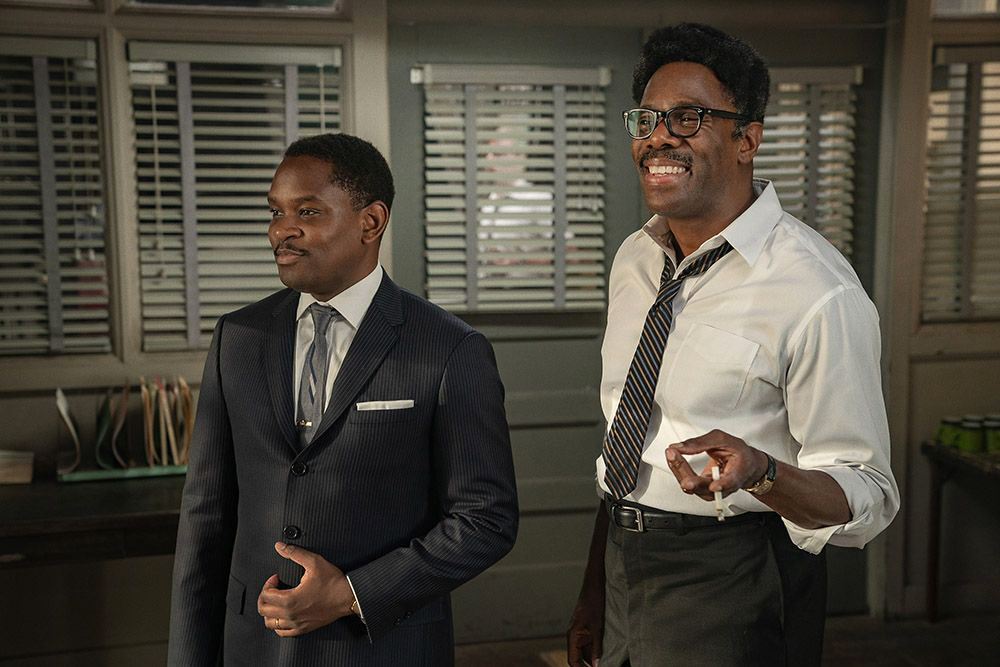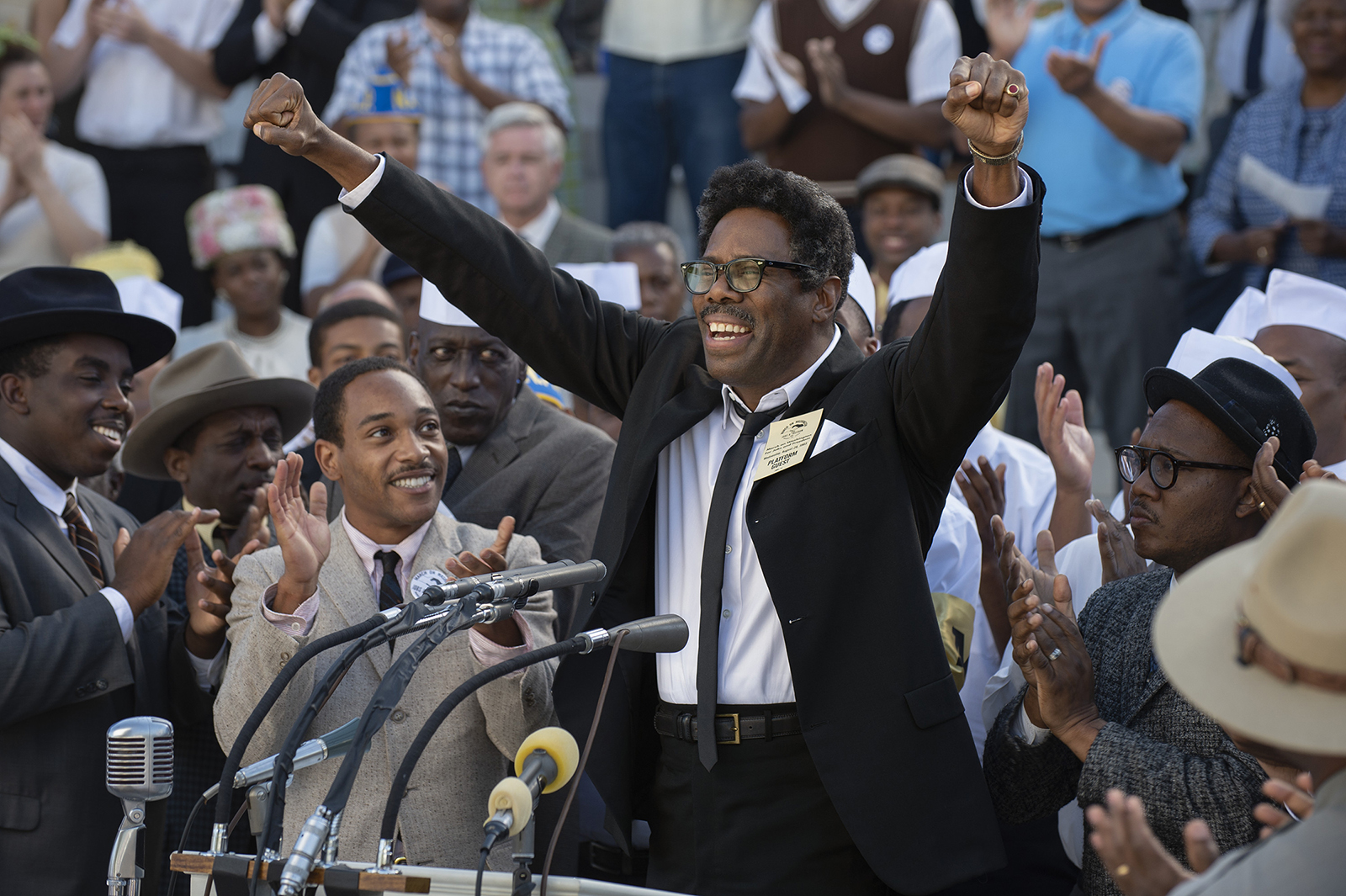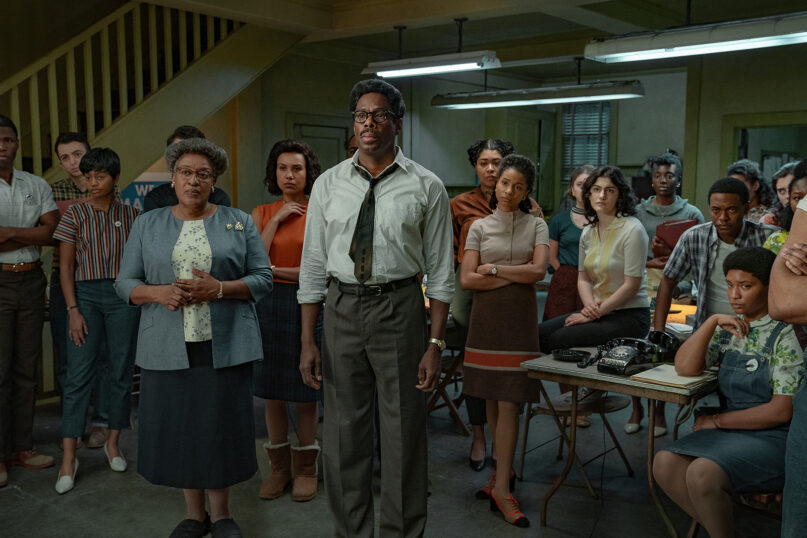(RNS) — Bayard Rustin’s contributions to the Civil Rights Movement were methodically marginalized and his role overshadowed by figures like the Rev. Martin Luther King Jr. It’s little surprise, given Rustin’s sexual orientation. Now, the Black gay man responsible for some of the most powerful elements of the civil rights era is getting his due.
The biopic “Rustin,” streaming on Netflix and executive produced by the Obamas, tells the story of this brilliant and charismatic figure and moves him from the wings of the civil rights drama of the 1950s and ’60s to center stage. It captures the courage, skill and good humor of the man some call “America’s Gandhi,” while leaving us wondering that he didn’t give up his fight for justice.
Had Rustin only lived loud and proud as a same-gender-loving man in the 1960s, his story would still be worth telling. But he did far more than that. Rustin is the man who brought Mohandas Gandhi’s ideas about nonviolent struggle back from his 1948 trip to India. It was Rustin who convinced King to get rid of the guns hidden in various place in the Ebenezer Church parsonage and embrace nonviolence. Moreover, Rustin organized the largest civil rights demonstration of the era: the 1963 March on Washington for Jobs and Freedom.
A necessary bridge between contentious factions of the civil rights struggle, he also had the ear and respect of luminaries such as Ella Baker, A. Philip Randolph, Roy Wilkins and Adam Clayton Powell. So many notable shifts toward racial progress in that era — the desegregation of the armed forces, co-founding of the Southern Christian Leadership Conference, integration of all-white unions for the AFL-CIO — are the result of his strategies.
But “Rustin” provides a further service in debunking popular myths about the Civil Rights Movement and provides important lessons for today’s freedom fighters.
Perhaps the most important myths the movie explodes have to do with the intersection of LGBTQ and Black identity. Rustin, played by Colman Domingo, tells King, “On the day I was born Black, I was also born a homosexual” — a message that contemporary ears still desperately need to hear. In conversations about Black liberation, the struggles of Black and LGBTQ people are too often seen as separate struggles.

Aml Ameen as Martin Luther King Jr., left, and Colman Domingo as Bayard Rustin in the new biopic “Rustin.” (Photo by David Lee/Netflix © 2022)
This is especially true among Afrocentric “hoteps,” who often frame queer identity as a destructive element for “the Black community,” as though we were a monolith. As a Black Lives Matter activist, I often heard Black Americans express doubts about the movement because two its founders identify as queer. This sadly raised fears for some that BLM would act as a sort of Trojan horse for wider acceptance of LGBTQ people.
Rustin is one of many historical examples to show that Black and queer are not mutually exclusive categories, and that Black queer people have always been in the vanguard of the liberation struggle.
Another collection of myths “Rustin” defies has to do with what makes nonviolent revolutions powerful. Rather than covering Rustin’s life from birth to death, the film focuses on the process of organizing the March on Washington.
Against the myth that movements depend on singular, messianic figures, we witness Rustin struggling to get a number of civil rights leaders and organizations to form a coalition to make the march happen. Far from depending on spontaneity and passion on the way to a big win, we see Rustin’s “angelic troublemakers” planning every painstaking detail, from training their own peacekeepers in nonviolent tactics to eliminate the need for a police presence to providing participants with peanut butter sandwiches instead of cheese because they’ll keep better in the summer heat.
Today’s activists who eschew strategy and avoid planning would do well to take note of this long-forgotten wisdom: The key to powerful nonviolent actions is organization.

Actor Colman Domingo as Bayard Rustin in the new biopic “Rustin.” (Photo by David Lee/Netflix © 2022)
“Rustin” calls attention as well to the influence of patriarchy, manifested in the homophobia and heterosexism its hero endures from colleagues, but in a more overarching way by highlighting the way women and their advocates had to fight to get speaking slot on the march’s program. Watch video of the March on Washington today and you’ll see that women’s stage time was still a fraction of that afforded to men.
Freedom fighters today should be willing to use these shortcomings as a mirror. Social justice warriors are often tempted to paint freedom struggles in rigid binaries of good and bad, with oppressors of pure evil and sanctified insurgents. “Rustin” shows that freedom movements are messy efforts launched by imperfect people — people who, given the opportunity, seek and wield oppressors’ power.
Why didn’t Rustin give up?
It seems he saw his life’s purpose as something that transcended any of the identities we tend to emphasize. “My activism did not spring from my being black,” he once said. “Rather, it is rooted fundamentally in my Quaker upbringing.” Rustin seemed determined to realize the Quaker doctrine that all people belong to “a single human family,” no matter the obstacles — even if some of those obstacles were his own people.
Rustin once famously said that “in every community we need a group of angelic troublemakers,” but this biopic reminds us that in every era we need a group of Bayard Rustins.






